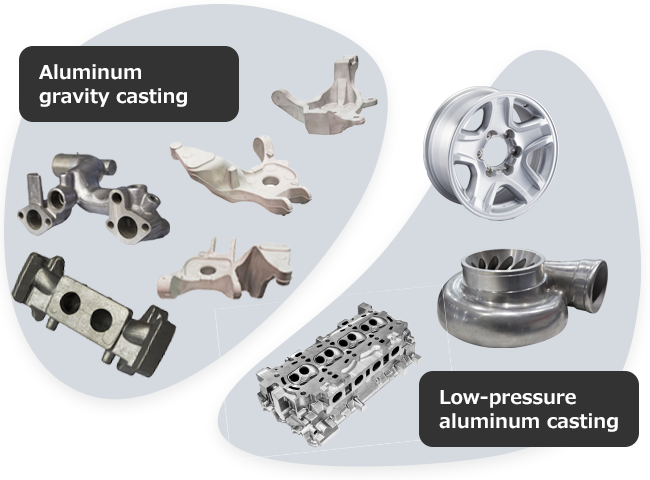Aluminum Foundry Wisconsin ensures dependable casting performance
Just How Aluminum Foundry Adds To Innovations in Aerospace Engineering
Aluminum foundries are integral to developments in aerospace design. They create lightweight, high-strength parts that are necessary for contemporary airplane. Through innovative casting strategies, these factories create intricate geometries that improve architectural stability. Furthermore, the development of premium Aluminum alloys sustains the market's concentrate on gas performance and sustainability. Obstacles continue to be in the production procedure. Recognizing these variables exposes the extensive impact of Aluminum on aviation's future.
The Value of Lightweight Products in Aerospace Style
As the aerospace sector continues to progress, the significance of lightweight products becomes significantly obvious. The demand for performance and sustainability drives engineers to prioritize making use of materials that minimize general weight without compromising architectural integrity. Lightweight materials, specifically Aluminum, play a necessary role in enhancing gas performance, improving payload capacity, and enhancing the general performance of airplane.
Additionally, the integration of these materials enables innovative layouts, making it possible for makers to produce more wind resistant shapes that can withstand severe problems. The reduction in weight not only decreases functional expenses however additionally adds to a decreased environmental footprint, lining up with international initiatives towards sustainability in air travel.
Advanced Casting Techniques in Aluminum Foundries
Advanced spreading methods in Aluminum factories play an important role in aerospace design by enabling the production of lightweight and accurate parts. Technologies in mold and mildew style and precision spreading processes are necessary in accomplishing excellent performance and structural stability. In addition, the advancement of lightweight alloys boosts the total effectiveness and efficiency of aerospace applications.
Innovative Mold And Mildew Style
Innovative mold and mildew style plays a vital role in the performance and performance of Aluminum factories, specifically within the aerospace industry. By leveraging sophisticated materials and strategies, contemporary mold and mildews can be engineered to withstand high temperature levels and pressures, making sure peak efficiency during the casting process. These styles commonly incorporate intricate geometries that permit the manufacturing of lightweight yet structurally audio parts, necessary for aerospace applications. In addition, making use of computer-aided layout (CAD) software promotes exact modeling, enabling foundries to replicate and refine mold and mildew designs before physical manufacturing begins. This not only boosts the quality of cast components yet likewise lowers waste and lead times, bring about considerable expense savings. Generally, innovative mold style is a keystone of progress in Aluminum Foundry innovation for aerospace design.
Accuracy Casting Procedures
The effectiveness of innovative mold layouts flawlessly integrates with precision casting processes, which are essential for generating top notch Aluminum parts in aerospace design. These procedures, including sand casting, pass away spreading, and investment casting, assure the production of complex geometries with tight tolerances. Advanced methods like vacuum spreading and stress die casting enhance the honesty and surface finish of the end products. Accuracy spreading reduces product waste while taking full advantage of the mechanical properties of Aluminum, vital for aerospace applications. On top of that, using real-time monitoring and advanced simulation tools throughout the spreading process permits instant adjustments, bring about enhanced quality assurance. Collectively, these precision spreading processes position Aluminum foundries at the center of aerospace technology, sustaining the market's demand for reliability and efficiency.
Lightweight Alloy Development
As aerospace designers seek to enhance fuel performance and efficiency, lightweight alloy growth ends up being a crucial emphasis in Aluminum foundries. These shops utilize advanced casting strategies to produce alloys that provide premium strength-to-weight proportions. Innovations in alloy make-up, including the incorporation of aspects like lithium and magnesium, allow the manufacturing of materials that withstand severe problems while minimizing general airplane weight. Methods such as die casting and investment casting facilitate the accuracy production of complicated forms, which are essential for aerospace applications. Additionally, continuous research intends to optimize these alloys for enhanced mechanical residential properties and increased durability. By focusing on lightweight alloy advancement, Aluminum shops significantly contribute to the advancement of aerospace engineering, paving the way for much more reliable and sustainable aircraft styles.

Enhancing Architectural Honesty Through Aluminum Parts
Aluminum parts provide considerable advantages in boosting architectural integrity within aerospace design. Their light-weight nature contributes to overall efficiency while preserving stamina, which is necessary for aircraft performance. Additionally, the tension resistance buildings of Aluminum aid assure the durability and reliability of aerospace frameworks under numerous functional problems.
Light-weight Product Conveniences
While typical materials frequently jeopardize weight for stamina, making use of Aluminum elements in aerospace design offers significant advantages in structural honesty. Aluminum's light-weight nature contributes to overall layout performance, enabling even more streamlined airplane that consume less gas, thus enhancing sustainability. The product's exceptional strength-to-weight ratio guarantees that parts preserve sturdiness without adding unneeded mass. This high quality fosters boosted performance and agility in trip, along with enhanced haul capabilities. Additionally, Aluminum's resistance to deterioration extends the life-span of aerospace structures, reducing maintenance expenses and boosting safety. As suppliers progressively take on Aluminum alloys, the aerospace market experiences a transformative change towards more effective and efficient engineering options that focus on both efficiency and ecological responsibility.
Tension Resistance Residences
Although different products possess unique buildings, Aluminum's exceptional stress and anxiety resistance sticks out as an important element in enhancing the structural integrity of aerospace parts. This resistance plays a crucial function in making sure that airplane can withstand various functional anxieties, including fatigue, influence, and environmental conditions. Aluminum alloys, especially crafted for aerospace applications, exhibit high tensile toughness while preserving light-weight characteristics, allowing engineers to create a lot more efficient structures - Aluminum Foundry. Furthermore, the capability of Aluminum to sustain cyclic loading without significant contortion adds to the longevity and dependability of aerospace elements. As improvements continue in Aluminum Foundry methods, the development of stress-resistant Aluminum components assures further improvements in efficiency, safety and security, and performance across the aerospace industry, solidifying Aluminum's role as a recommended product in modern-day design
Fuel Effectiveness Improvements Driven by Aluminum Innovations
As the aerospace industry seeks to boost gas effectiveness, cutting-edge usages of Aluminum have become a crucial solution. Aluminum's lightweight nature especially decreases aircraft weight, permitting reduced fuel usage throughout flight. This reduction in weight is essential, as also tiny declines can lead to considerable enhancements in overall gas look at this web-site economic situation.
Advanced Aluminum alloys, created for enhanced strength and resilience, allow makers to create components that maintain structural stability while minimizing mass - Aluminum Foundry. Additionally, the combination of Aluminum in airframes and engine parts promotes improved the rules of aerodynamics, adding to reduced drag and enhanced efficiency
The fostering of Aluminum in aerospace not just meets the need for fuel-efficient design yet additionally straightens you could try here with governing stress for lower exhausts. As these technologies proceed to progress, they play a significant duty in establishing new benchmarks for fuel performance, ensuring that the aerospace industry can satisfy growing environmental and economic challenges.

The Role of Aluminum in Sustainable Aviation Practices
The enhancing focus on lasting air travel methods has actually placed Aluminum as a necessary product in the quest for greener aircraft design. Recognized for its light-weight buildings, Aluminum substantially lowers aircraft weight, causing lower fuel usage and discharges. Its recyclability better improves its sustainability profile, as Aluminum can be recycled indefinitely without loss of high quality. This particular supports a circular economic situation within the aviation market, decreasing waste and source deficiency.
Advancements in Aluminum alloys have actually boosted their strength and corrosion resistance, allowing for longer solution life and lowered maintenance demands. These developments help with the advancement of much more efficient aircraft structures, adding to general sustainability efforts. In addition, Aluminum's thermal conductivity plays an important duty in energy-efficient styles, enhancing systems such as warm exchangers. Collectively, these features underscore Aluminum's crucial function ahead of time lasting aeronautics, lining up with global initiatives targeted at minimizing the ecological influence of air travel.
Difficulties Faced by Aluminum Foundries in Aerospace Manufacturing
While Aluminum factories play an important duty in aerospace production, they face substantial challenges that can affect manufacturing effectiveness and top quality. One major challenge is the stringent quality assurance requirements needed in the aerospace market. Any type of problem can compromise safety and security and efficiency, necessitating extensive examination processes that prolong production timelines. Additionally, factories commonly emulate rising and fall basic material expenses, which can impact rates and productivity. The intricacy of Aluminum alloys used in aerospace applications additional makes complex the production process, as precise formulas are vital for attaining desired mechanical buildings. Experienced labor lacks hinder the capacity to keep premium production degrees. Environmental laws impose limitations on discharges and waste monitoring, requiring foundries to invest in lasting practices, which can be cost-prohibitive. These variables jointly develop a landscape where Aluminum factories should continually adjust to satisfy the advancing demands of aerospace production while making sure safety and security and conformity.
Future Fads in Aluminum Applications for Aerospace Engineering
With advancements in technology and raising demands for performance, the future of Aluminum applications in aerospace engineering is poised for considerable change. The integration of innovative Aluminum alloys and composites is expected to improve strength-to-weight proportions, resulting in even more fuel-efficient airplane designs. On top of that, advancements in additive production methods will enable the production of complex Aluminum frameworks that were previously difficult, maximizing efficiency and lowering waste.

Lasting practices will play a vital duty, with an expanding focus on reusing Aluminum to lessen environmental impact. The aerospace industry is likely to accept smarter producing processes, such as automation and artificial knowledge, guaranteeing greater top quality and precision in Aluminum components. Furthermore, partnerships between Aluminum foundries and aerospace business will certainly promote research and growth, leading the way for new applications that satisfy the rigorous demands of modern aerospace engineering - Aluminum Foundry. why not find out more Overall, the future looks guaranteeing for Aluminum's function in forming the skies
Often Asked Questions
What Are the Ecological Influences of Aluminum Production in Aerospace?
The ecological impacts of Aluminum manufacturing in aerospace include significant energy usage, greenhouse gas exhausts, and environment disruption. In addition, mining processes can bring about dirt degradation and water contamination, elevating worries about sustainability and ecological equilibrium.
Just How Does Aluminum Contrast to Other Materials in Aerospace Applications?
Aluminum uses an one-of-a-kind combination of lightweight residential or commercial properties, corrosion resistance, and cost-effectiveness compared to other products. Its high strength-to-weight proportion makes it especially advantageous for aerospace applications, boosting gas performance and overall performance in aircraft style.
What Credentials Do Aluminum Foundry Workers Demand for Aerospace Projects?
Aluminum Foundry workers need customized training in metallurgy and casting techniques, in addition to knowledge of aerospace sector requirements. Accreditations in quality assurance and security protocols are likewise important to guarantee compliance with rigid aerospace project requirements.
Exist Any Type Of Security Interest In Making Use Of Aluminum in Aerospace Design?
Security issues concerning Aluminum in aerospace design consist of susceptibility to rust, fatigue, and stress and anxiety cracks. Appropriate therapy and alloy option are important to reduce these threats, making certain architectural integrity and general security in aerospace applications.
How Does Aluminum Recycling Advantage the Aerospace Industry?
Aluminum recycling greatly benefits the aerospace industry by decreasing product costs, reducing environmental impact, and conserving power. This sustainable practice enhances the market's efficiency while promoting making use of light-weight, high-performance components in aircraft production.
Advanced casting strategies in Aluminum shops play an important duty in aerospace engineering by making it possible for the manufacturing of lightweight and specific components. Cutting-edge mold style plays an essential role in the efficiency and efficiency of Aluminum factories, especially within the aerospace market. As aerospace designers seek to boost gas efficiency and efficiency, lightweight alloy advancement becomes an important emphasis in Aluminum factories. Aluminum alloys, especially crafted for aerospace applications, show high tensile stamina while maintaining light-weight qualities, allowing designers to create much more reliable frameworks. Collaborations in between Aluminum factories and aerospace business will certainly cultivate study and advancement, paving the means for brand-new applications that fulfill the rigorous needs of modern aerospace engineering.